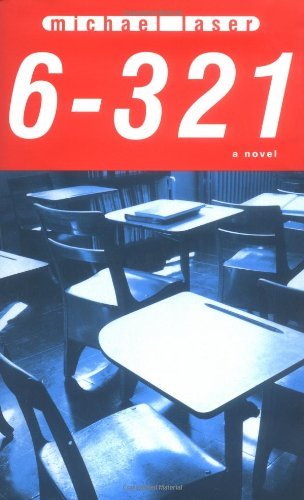A novel for 10-14 year olds (2001)
When his sixth grade class, 6-321, gets caught up in a feud with another class, Marc Chaikin’s life gets turned upside down. At the same time, he competes with the most popular boy in the class for Lily Wu, the object of his all-consuming crush… and he has to deal with the dissolution of his parents’ marriage. Set in NYC in 1963, this autobiographical novel captures both a distant moment in history and the familiar aches of a boy on the brink of adolescence.
(Parents will enjoy the nostalgic details on every page: an especially good choice for school reading and for parent/child book groups.)
•
The reward for readers is a series of poetically crystallized moments as a boy on the brink of manhood becomes initiated into the larger world outside classroom 6-321.
– Publishers Weekly
I thought this book was one of the best books I’ve ever read… I recommend this book to people of all ages…
– A reader from Ohio, on Amazon.com
Excerpt:
The Monday after the party, when I came down the ramp into the schoolyard after lunch, Cary called my name. He was near the handball courts, flipping baseball cards with a kid from another class. He asked if I had any cards on me. I always keep a few in my coat pocket to study statistics, but only the best ones, the players whose statistics you would care about, not the kind you gamble away. I didn’t want to seem afraid of losing, though, so I said, “I’ve got some.” He said, “Let’s flip.”
Cary had his own technique for flipping cards. He swung his arm back and forth in a relaxed way and then just let the card go twirling down to the ground. I had never believed that you could really control fronts or backs, but I found out I was wrong.
My first flip landed with the back up, unlike his. Goodbye, Whitey Ford.
As Cary bent to pick up the cards, he asked, “Are you still planning to ask Lily out?”
All I had to do was say, “Naw, she’s just an old friend,” and I would save myself a lot of pain. If I didn’t give up, I knew he would find a thousand ways to embarrass me in front of Lily. And what chance did I have against him anyway?
But I didn’t want to give up. I didn’t want to lose Lily, and also I had my pride. So I said, “Yeah, I am.”
“Because you should know, this is serious for me. I really like her.”
“So do I.”
He let out a hoarse, nervous laugh, but didn’t say anything else.
In the time it took to have our short conversation, he won not only my Whitey Ford, but also Maury Wills, Tony Kubek and Harmon Killebrew. He just put them in his pocket and walked away. That gave me a rough idea of what to expect from then on.
Comments:
Turning the aches and triumphs of childhood into a story more than thirty years after the fact turned out to be a more complicated task than I expected.
I had wanted to write about sixth grade for a long time, because the memories meant so much to me. This was the turning point in my life: the moment when a demanding teacher encouraged me.
There were so many stories to tell, I didn’t know where to start. Sitting down with my class picture one night, I typed everything I could remember about each person: their nicknames, their talents, their witticisms, what their homes looked like.
In order to fit all of these stories in, I wrote the book as an epic the first time around, with multiple plots and a full class of thirty-one students. An editor pointed out, though, that I had put in far too much stuff. So I revised: cutting out whole subplots and developing other parts of the story more fully.
In the course of writing the book, I replaced certain true but dull details with more interesting fictions. For example, the sweet girl I had a crush on in sixth grade was Jewish, like almost everyone else in my neighborhood; I made her Chinese-American.
One of the most important parts of 6-321 is the narrator’s voice. In order to make Marc Chaikin sound real, I went back to the papers I’d saved from sixth grade: homework, school newspaper articles, and my scrapbook. Marc’s storytelling doesn’t sound quite as clumsy as my own writing at his age, but I did use certain phrases that popped up repeatedly. (In my scrapbook, especially, I affected a lofty disdain for everything, and described whatever I didn’t admire as garbage.)
You wouldn’t think that writing your own history would require research, but I spent many hours in the library, taking notes on which news stories happened when, and what ads were out that year, and even what topics were covered in the New York City curricula for sixth grade. All of these pieces of information stirred up memories and enriched the story. And, really, it was fun to dive back into the past that way, and to discover that, in every issue of Time magazine, there were news events that I vividly remembered.
The simple point of all this is that much more goes into telling an autobiographical story than it may seem.
